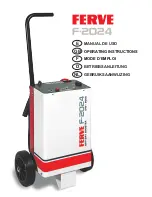
1. Air compressor (inside)
2. Diverter knob
3. On/Off button
4. Air pressure gauge
5. Deflation button
6. Sealant bottle/canister
7. Sealant filling clear tube
8. Sealant tube — tire valve
connector
9. Yellow cap tool
10. Air compressor hose
11. Air hose — tire valve connector
12. Accessory power plug
13. Casing/housing
General information
WARNING:
Failure to follow these guidelines could result in an
increased risk of loss of vehicle control, injury or death.
Do not attempt to repair punctures larger than
1
⁄
4
inch (6.4 mm) or
damage to the tire’s sidewall. The tire may not completely seal.
Note:
Do not use the temporary mobility kit if a tire has become
severely damaged by driving the vehicle with a tire that has insufficient
air pressure. Only punctured areas located within the tire tread can be
sealed with the temporary mobility kit.
Loss of air pressure may adversely affect tire performance. For this reason:
•
Do not
drive the vehicle above 50 mph (80 km/h).
•
Do not
drive further than 120 miles (200 km). Drive only to the
closest Ford Motor Company authorized dealer or tire repair shop to
have your tire inspected.
•
Drive carefully and avoid abrupt steering maneuvers.
•
Periodically monitor tire inflation pressure in the affected tire; if the
tire is losing pressure, have the vehicle towed.
•
Read the information in the
Tips for use of the temporary mobility
kit
section to ensure safe operation of the temporary mobility kit and
your vehicle.
1
2
4
5
6
7
12
11
10
8
3
9
13
Roadside Emergencies
341
2011 Explorer
(exp)
Owners Guide, 4th Printing
USA
(fus)
















































